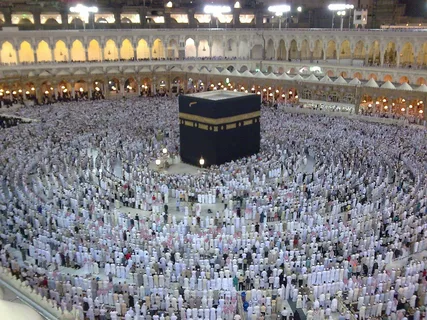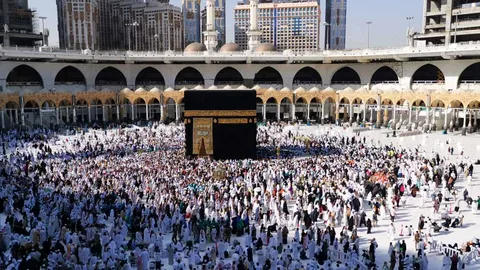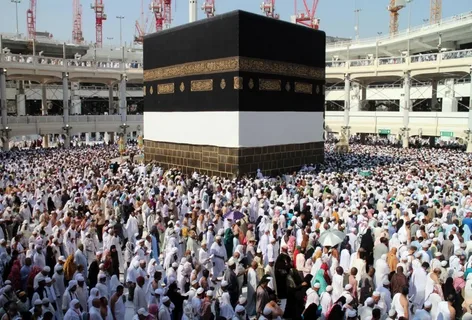Hajj, one of the five pillars of Islam, is not only a spiritual journey but a transformative experience that impacts millions of Muslims around the world annually. It serves as a profound manifestation of faith, bringing together followers from diverse backgrounds to the holy city of Mecca. in This article on Arabian Tongue website we will explores the 5 importance of Hajj, underscoring its spiritual, social, historical, and personal significance.
5 importance of hajj

Hajj, the annual pilgrimage to Mecca, is one of the five pillars of Islam and holds profound religious, spiritual, social, and cultural significance for Muslims worldwide. Here are five important aspects of Hajj:
1. The Spiritual Awakening
- Renewal of Faith: Hajj offers a unique opportunity for Muslims to renew their faith and strengthen their bond with Allah. The rituals performed during Hajj, such as the Tawaf (circumambulation of the Kaaba) and the Sa’i (walking between Safa and Marwah), are not only acts of worship but also powerful symbols of devotion and submission to the divine will.
- Connection with the Divine: The journey to Mecca allows pilgrims to step away from their daily routines and immerse themselves in an environment wholly dedicated to spiritual reflection and growth. This connection is palpable, especially on the Day of Arafah, considered the climax of Hajj, where pilgrims stand in prayer asking for forgiveness and blessings.
2. Unity Amongst the Ummah
- Fostering Global Islamic Brotherhood: Hajj brings together Muslims from all corners of the globe, fostering a sense of brotherhood and unity. This gathering is one of the largest peaceful religious assemblies in the world, promoting solidarity and mutual understanding among the Ummah (global Muslim community).
- Experiencing the Diversity of the Muslim World: Pilgrims wearing simple and similar attire demonstrate the Islamic principle that all humans are equal regardless of their geographical, racial, or economic differences. This visual and physical expression of unity serves to remind participants and the world of the core Islamic values of equality and brotherhood.
3. Historical Continuity
- Walking in the Footsteps of Prophets: Hajj allows Muslims to walk in the footsteps of the Prophet Muhammad and other prophets before him, including Ibrahim (Abraham). This connection to their history and tradition is a powerful reminder of their heritage and the endurance of their faith through centuries.
- Reliving Islamic History: The rituals of Hajj are deeply embedded with historical events, such as the sacrifice of Ibrahim, which is commemorated by the global Muslim community during Eid Al-Adha, coinciding with the days of Hajj. This historical continuity is vital for understanding the depth and the enduring relevance of Islam.
4. Personal and Moral Development
- Lessons in Patience and Perseverance: what is the significance of hajj in islam with its large crowds and the physical rigor of the rituals teaches pilgrims patience and perseverance. These virtues are essential in the personal development of a Muslim and are expected to be carried into their daily lives after their return.
- Emphasis on Humility and Equality: The state of Ihram, where pilgrims wear simple white garments, serves as a stark reminder of human mortality and the insignificance of worldly possessions. This enforced humility is a profound equalizer among pilgrims, emphasizing the Islamic tenet that all humans are equal in the eyes of God.
5. Economic Impacts
- Boost to Local Economies: Hajj significantly contributes to the local economy of Mecca and surrounding areas. Services related to hospitality, transportation, and food experience a surge during the pilgrimage season, providing substantial economic benefits.
- International Economic Interactions: The influx of pilgrims has broader economic implications beyond Saudi Arabia. Many countries benefit from travel agencies, airlines, and a myriad of services related to Hajj preparations. This interaction fosters economic ties and interdependencies among nations.
The Rituals of Hajj and their Meanings

The Hajj pilgrimage is rich with profound rituals, each symbolizing the trials of Abraham (Ibrahim) and his family, expressing the unity of the Muslim community, and representing a renewal of faith. Here are the key rituals of Hajj and their meanings:
Ihram – The State of Spiritual Purity
Entering the state of Ihram marks the beginning of Hajj. This state of spiritual purity is crucial for performing Hajj and symbolizes the shedding of worldly concerns and the focus on the divine.
Tawaf – Circumambulating the Kaaba
The act of Tawaf, circling the Kaaba seven times, is a central ritual of Hajj. It represents the unity of believers in the worship of the One God, as they move in harmony around the Kaaba, spiritually revolving around the same focal point.
The Day of Arafah
The Day of Arafah stands as the pinnacle of the Hajj. Pilgrims gather at the plain of Arafat to pray and seek God’s mercy. It’s a day of repentance and supplication and is often considered as the day when God is closest to the believer.
Muslims believe that being at Arafah on this day expiates the sins of the past and coming year. The immense gathering, the sincere prayers, and the shared hope for forgiveness highlight the deep spiritual significance of this day.
Eid Al-Adha and Its Connection to Hajj
Eid Al-Adha, which occurs at the end of Hajj, commemorates Prophet Ibrahim’s willingness to sacrifice his son as an act of obedience to God. Pilgrims celebrate this event through the ritual slaughter of an animal, which is then shared with the poor.
This aspect of Hajj emphasizes the principles of charity and compassion in Islam. By distributing meat to the needy, pilgrims fulfill a social obligation that underscores the communal and inclusive spirit of Islam.
FAQs
What is the best time to perform Hajj?
Hajj must be performed during the specific Islamic month of Dhu al-Hijjah. The exact dates vary each year based on the lunar calendar.
How does Hajj promote peace and understanding among Muslims?
By bringing together millions from different cultures and backgrounds, Hajj fosters a sense of global unity and mutual respect among Muslims.
Can Hajj be performed on behalf of others?
Yes, Hajj can be performed on behalf of others, particularly for those who are physically or financially unable to undertake the pilgrimage themselves.
What are some of the environmental challenges associated with Hajj?
The major challenges include managing waste, reducing overcrowding, and minimizing the carbon footprint of the massive influx of pilgrims.
How has Hajj adapted to modern technology?
Modern technology has been embraced in managing the logistics of Hajj, improving safety, and enhancing the experience of the pilgrims through apps, electronic tracking, and better communication systems.
Conclusion
The Hajj is not just a religious obligation; it is a powerful, transformative experience that offers profound spiritual renewal, fosters global unity, and serves as a reminder of the shared heritage and responsibilities of Muslims worldwide. Its impacts are felt on personal, social, and economic levels, making it a cornerstone of the Islamic faith.


